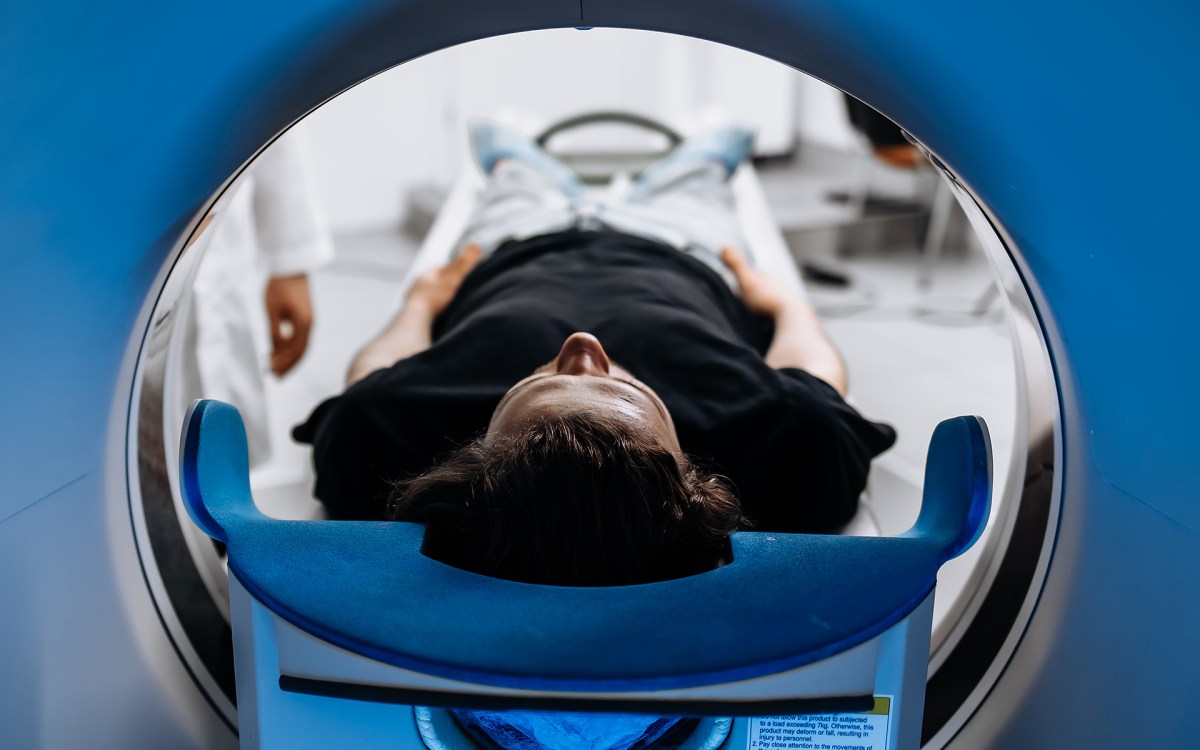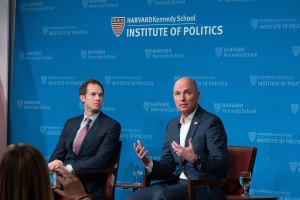Tag: Research
-
Health
Protective mechanism fails when obesity sets in
Reporting in the journal Cell Metabolism, researchers from the Harvard School of Public Health (HSPH) said they have shown for the first time that fat-storing cells, or adipocytes, contain a protective anti-inflammatory immune mechanism that prevents the cells from overreacting to inflammation-causing stimuli, such as fatty acids in the diet.
-
Science & Tech
Small suds make a big splash at SEAS
The latest engineering feat to emerge from the laboratories at Harvard’s School of Engineering and Applied Sciences has been largely accomplished with the aid of kitchen mixers. Researchers have whipped up, for the first time, permanent nanoscale bubbles — bubbles that endure for more than a year — from batches of foam made from a…
-
Health
New report finds low vitamin D levels appear common in ‘healthy’ children
Many infants and toddlers may have low levels of vitamin D, and about one-third of those appear to have some evidence of reduced bone mineral content on X-rays, according to a report in the June issue of Archives of Pediatrics & Adolescent Medicine, one of the JAMA/Archives journals.
-
Health
Video game technology may help surgeons
In a study funded by the National Institutes of Health (NIH) featured on the cover of this month’s Journal of Thoracic and Cardiovascular Surgery, cardiac surgeons from Children’s Hospital Boston report good results with a simple technology borrowed from the gaming industry: stereo glasses.
-
Campus & Community
Hoopes Prize winners number more than 80
More than 80 Harvard College seniors have been named Thomas T. Hoopes Prize winners for outstanding scholarly work or research. The prize is funded by the estate of Thomas T. Hoopes ’19. The recipients, including their research and advisers, are as follows:
-
Health
NIH awards HMS $117.5M, five-year grant for patient-centered research
The National Institutes of Health (NIH) has announced that Harvard Medical School (HMS) will receive $117.5 million over the next five years for the establishment of a Clinical and Translational Science Center (CTSC) that will transform patient-oriented, laboratory-to-bedside research at HMS and its affiliated hospitals.
-
Campus & Community
CES announces student grant recipients
Continuing its tradition of promoting and funding student research on Europe, the Minda de Gunzburg Center for European Studies (CES) has announced its selection of nearly 50 undergraduates for thesis research grants and internships in Europe this summer.
-
Campus & Community
Herchel Smith Research Fellows to begin this summer
The Herchel Smith Undergraduate Summer Research Fellowship provides financial support to Harvard undergraduates engaged in scientific research at established research centers and laboratories in the United States or abroad.
-
Campus & Community
Committee on African Studies awards grants
The Harvard Committee on African Studies has awarded nine research grants to Harvard students for travel to sub-Saharan Africa during the summer of 2008.
-
Campus & Community
Newsmakers
DEPT.OF SLAVIC LANGUAGES AND LITERATURES AWARDS PRIZES HUMBOLDT FOUNDATION ELECTS VISITING PROFESSOR KOBAYASHI GILDER LEHRMAN SCHOLAR NAMED ACKERMAN PRESENTS ADDRESS AT ITALIAN CONFERENCE CHA’S KEEFE RECEIVES LIFETIME ACHIEVEMENT AWARD GOMES TO FETE ORDINATION ANNIVERSARY
-
Campus & Community
Weatherhead awards doctoral candidates with research grants
The Weatherhead Center for International Affairs has selected 11 Harvard doctoral candidates to receive pre- and mid-dissertation grants to conduct research on a project related to the core research interests of the center. In addition and for the first time in 2008, the center is awarding four foreign language grants to doctoral students to assist…
-
Campus & Community
Yivo institute honors Summers
The YIVO Institute for Jewish research honored Charles W. Eliot University Professor Lawrence H. Summers on May 13 at its 83rd annual benefit dinner. The ceremony was held at the Center for Jewish History in New York City.
-
Campus & Community
Kieffer awarded International Reading Fellowship
Michael Kieffer, an advanced doctoral student in language and literacy at the Harvard Graduate School of Education, is the recipient of the International Reading Association’s (IRA) Jeanne S. Chall Research Fellowship.
-
Health
Prostate cancer treatments are contrasted
Jim Hu and colleagues at Harvard-affiliated Brigham and Women’s Hospital (BWH) assessed surgical utilization and complications, lengths of hospital stay, and cancer outcomes in more than 2,700 men who underwent prostate cancer surgery.
-
Health
Undergrads volunteer for Nalgene bottle BPA study
For a while last month, whenever Scott Elfenbein ’11 was thirsty he’d take a pull or two from a Nalgene bottle. But Elfenbein was quaffing from Nalgene for science, not for convenience. He was one of about 80 Harvard College students who volunteered for a two-week April study intended to track levels of bisphenol A…
-
Campus & Community
THURJ provides forum for students
Spanning topics as diverse as cancerous tumors and the overfishing of grouper in the Turks and Caicos Islands, a new journal aims to highlight the serious scientific research regularly undertaken by Harvard undergraduates.
-
Nation & World
Candidates emphasize hot-button issues
D. Sunshine Hillygus, Frederick S. Danziger Associate Professor of Government in the Faculty of Arts and Sciences at Harvard University, and Todd G. Shields, professor of political science at the University of Arkansas, extensively studied campaign strategy during the 2004 general election, work that may illuminate strategy in the current presidential race.
-
Nation & World
Joint Center for Housing sees mortgage turmoil hitting rental market
The current mortgage turmoil reaches deep into rental markets. New research on rental housing market dynamics from Harvard University’s Joint Center for Housing Studies finds that the current housing debacle not only adds to the number of households competing for low-cost rentals but also threatens renters living in foreclosed properties with sudden eviction.
-
Health
TB talks honor outgoing HSPH dean
Tuberculosis specialists came from universities around the country to discuss the state of the disease at the Harvard School of Public Health (HSPH) and to honor Harvard School of Public Health Dean Barry R. Bloom, who has announced that he will be stepping down.
-
Health
Researchers report successful new laser treatment for vocal-cord cancer
An innovative laser treatment for early vocal-cord cancer, developed at Massachusetts General Hospital (MGH), successfully restores patients’ voices without radiotherapy or traditional surgery, which can permanently damage vocal quality.
-
Health
Research reveals workings of anti-HIV drugs
Using ingenious molecular espionage, scientists have found how a single key enzyme, seemingly the Swiss Army knife in HIV’s toolbox, differentiates and dynamically binds both DNA and RNA as part of the virus’s fierce attack on host cells. The work is described this week (May 7) in the journal Nature.
-
Health
Risk of death reduced within years of quitting smoking
Women who quit smoking significantly reduce their risk of death from coronary heart disease within five years and have about a 20 percent lower risk of death from smoking-related cancers within that time period, according to a study in the May 7 issue of JAMA.
-
Nation & World
Rothschild explores economics’ human side
Blackmail and attempted murder are not typically studied as part of economic history. However, a credit crisis among 18th century French silk and brandy merchants led to just such dramatic incidents, the accounts of which piqued the interest of Emma Rothschild, a historian of economic life, empires, and Atlantic connections.
-
Health
SEAS initiative supported by up to $20 million in BASF funding
The official opening of the BASF Advanced Research Initiative at Harvard was celebrated with an inaugural two-day symposium (April 29-30) on biofilms.
-
Health
Hormone therapy linked to increased risk of stroke
Postmenopausal women taking hormone therapy appear to have an increased risk of stroke regardless of when they started treatment, according to a report in the April 28 issue of Archives of Internal Medicine, one of the JAMA/Archives journals.
-
Health
Recent study: Better to be fit and thin than fit and fat
The risk of heart disease in women associated with being overweight or obese is reduced but not eliminated by higher levels of physical activity, according to a report in the April 28 issue of Archives of Internal Medicine, one of the JAMA/Archives journals.
-
Health
Molecular analysis of T. rex protein shows shared avian ancestry
Putting more meat on the theory that dinosaurs’ closest living relatives are modern-day birds, molecular analysis of a shred of 68 million-year-old Tyrannosaurus rex protein — along with that of 21 modern species — confirms that dinosaurs share common ancestry with chickens, ostriches, and to a lesser extent, alligators.
-
Campus & Community
AAPT to honor mazur for contributions to teaching
The American Association of Physics Teachers (AAPT) has named Balkanski Professor of Physics and Applied Physics Eric Mazur its Robert A. Millikan Medal recipient.
-
Campus & Community
HDS names new associates for 2008-09
The Women’s Studies in Religion Program at the Harvard Divinity School recently announced its selection of five scholars as 2008-09 research associates and visiting faculty.


